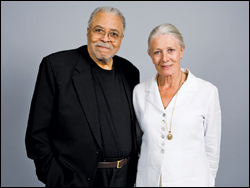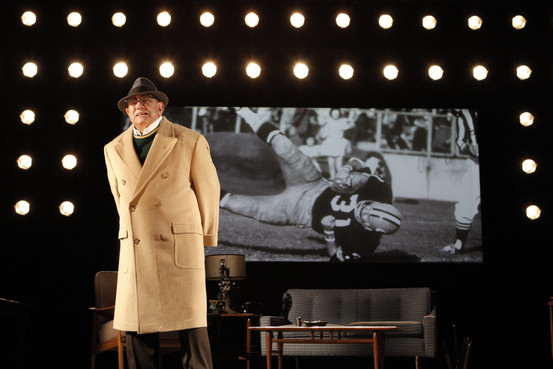A rare sound film of Sir Arthur Conan Doyle, the creator of Sherlock Holmes:
(This is the latest in a weekly series of arts-related videos that appear in this space each Wednesday.)
Archives for October 2010
TT: Almanac
“Critics must have been created on the seventh day. Because if God had created them on the first day, what on earth would they have done?”
Edmond and Jules de Goncourt, journal entry, Mar. 8, 1863
TT: A perfect night on Broadway
Due to heightened national interest in the Broadway premiere of Driving Miss Daisy, The Wall Street Journal asked me to write a special review that would run not in the Greater New York section but on the paper’s national arts page. The show opened last night and the review is in this morning’s Journal. My editors called it–the production is remarkable. Here’s an excerpt.
* * *
Everybody I know who saw the 1987 Off-Broadway production of Alfred Uhry’s “Driving Miss Daisy” remembers it with awe and affection, and agrees that the cast–Morgan Freeman, Dana Ivey and Ray Gill–couldn’t be bettered. If you’re one of those lucky folk, I suggest that you head straight for Broadway, where James Earl Jones, Vanessa Redgrave and Boyd Gaines are proving that when it comes to great acting, nobody ever has the last word. Alas, I saw Mr. Freeman only in the 1989 film version of “Driving Miss Daisy,” in which he was wonderful. Mr. Jones, however, has put a wholly personal spin on the part, and he’s giving a performance that is going to be talked about for the rest of his life–and after….
 Where Mr. Freeman endowed Hoke with his own characteristic slyness, Mr. Jones opts instead to play him as a plain, blunt countryman whose sense of humor (if you can call it that) amounts to saying exactly what he thinks. I suspect that this approach is rather more realistic than that of Mr. Freeman, who in the film occasionally struck me as the least little bit too urbane to be true, and its effect is doubled and redoubled by Mr. Jones’ foghorn voice and mammoth physical presence. If you want to know what star quality means, this is it.
Where Mr. Freeman endowed Hoke with his own characteristic slyness, Mr. Jones opts instead to play him as a plain, blunt countryman whose sense of humor (if you can call it that) amounts to saying exactly what he thinks. I suspect that this approach is rather more realistic than that of Mr. Freeman, who in the film occasionally struck me as the least little bit too urbane to be true, and its effect is doubled and redoubled by Mr. Jones’ foghorn voice and mammoth physical presence. If you want to know what star quality means, this is it.
During the first part of the play, I wondered whether Ms. Redgrave, who plays Daisy in a fairly low key, was going to get upstaged in a big way by Mr. Jones. Before long, though, I figured out that what I was seeing was in fact a smart decision by a seasoned pro. The only way to “compete” against a performance as dynamic as the one being given by Mr. Jones is to come at it from a different angle, and by underplaying the idiosyncrasies of the combative, querulous Daisy, Ms. Redgrave slips out from under his long shadow and makes an equally deep and persuasive impression….
* * *
Read the whole thing here.
The theatrical trailer for the 1989 film of Driving Miss Daisy:
TT: Almanac
“The art of pleasing consists in never speaking of oneself and always talking to others of themselves. Every one is aware of this, yet how often is it forgotten.”
Edmond and Jules de Goncourt, journal entry, Mar. 4, 1860
TT: I shall return
 For me, being sick on the road is unspeakably frustrating—especially when I’m in an unfamiliar city that I want to explore. As I mentioned on Friday, I spent the weekend in Tucson, Arizona, and though I longed to hop in my rental car and check the place out, I chose instead to play it smart and stuck close to my hotel room, devoting Saturday morning to writing my Wall Street Journal review of Driving Miss Daisy and going out only to deliver two speeches (both of which seemed to go well) and see the play that I’d come to town to review. I did manage, however, to eat a meal at El Charro, one of the restaurants to which I’d been steered by aficionados of Mexican cuisine, and so I can say that the carne seca is every bit as good as its reputation. Otherwise, I mostly saw Tucson from my eleventh-floor window, a view that made me want very much to come back and stay a little longer.
For me, being sick on the road is unspeakably frustrating—especially when I’m in an unfamiliar city that I want to explore. As I mentioned on Friday, I spent the weekend in Tucson, Arizona, and though I longed to hop in my rental car and check the place out, I chose instead to play it smart and stuck close to my hotel room, devoting Saturday morning to writing my Wall Street Journal review of Driving Miss Daisy and going out only to deliver two speeches (both of which seemed to go well) and see the play that I’d come to town to review. I did manage, however, to eat a meal at El Charro, one of the restaurants to which I’d been steered by aficionados of Mexican cuisine, and so I can say that the carne seca is every bit as good as its reputation. Otherwise, I mostly saw Tucson from my eleventh-floor window, a view that made me want very much to come back and stay a little longer.
Alas, I would have had to leave on Sunday even if I’d been at my picture-perfect best, for the off-Broadway revival of Tony Kushner’s Angels in America opens this week, and the only evenings on which I could catch preview performances of the two installments were tonight and Tuesday. So I flew back to New York with a good deal of reluctance, still sniffling and coughing but feeling a bit better, if by no means completely well.
I know myself, and one of the things I know is that I have a pronounced tendency to respond to signs of recovery from an illness by stepping hard on the gas pedal of my life instead of giving myself a chance to shake the bug off completely. My goal for the coming week is to keep on playing it smart instead of working myself into a relapse. Let’s see how I do!
TT: Almanac
“I was brought up in times when one was not ashamed to be happy, and I have never learned the art of discontent.”
John Buchan, Pilgrim’s Way: An Essay in Recollection
TT: Talking cure
Bronchitis or no bronchitis, I’m hitting the road this morning. My destination is Tucson, Arizona, where I’ll be seeing the Arizona Theatre Company’s production of August Wilson’s Ma Rainey’s Black Bottom and delivering the keynote address for A Corigliano/Takemitsu
Festival: Music and Film, a festival devoted to the music of John Corigliano and Toru Takemitsu that is being presented by the University of Arizona School of Music. The title of my talk, which takes place tonight at 7:30, is “Does American Culture Have a Future?” Brace yourself!
For more information about the festival and my speech, go here.
TT: One for the guys
In today’s Wall Street Journal drama column I review the Broadway premiere of Lombardi, a play by Eric Simonson about the famous major-league football coach. Very much to my surprise, I liked it enormously. Here’s an excerpt.
* * *
The question in the minds of just about everybody who’s written about Eric Simonson’s “Lombardi” to date is this: Who’s going to go see a play about a football coach who died 40 years ago? If memory serves, the last sports-themed play to do really well on Broadway was Richard Greenberg’s “Take Me Out,” whose protagonist, a center fielder, is not only gay but biracial to boot. Somehow I doubt there’s much of an overlap between the audience for “Take Me Out” and the target market for “Lombardi,” whose title character, the Jesuit-schooled, fanatically competitive Vince Lombardi, was one of the straightest arrows ever to come out of the quiver (though he had a gay brother and was by all accounts tolerant of closeted football players). All this notwithstanding, the National Football League has put its marketing muscle behind “Lombardi” in return for a piece of the action, presumably operating on the assumption that there are plenty of men out there who don’t usually go to Broadway shows (O.K., maybe they liked “Jersey Boys”) but might be willing to make an exception for this one.
 And why should you care? Because instead of cranking out a “Give ‘Em Hell, Harry”-type exercise in feel-good historical hagiography, Mr. Simonson has given us an extremely well-crafted piece of intelligent middlebrow theater, a regular-guy equivalent of “Frost/Nixon.” Such plays rarely make it to Broadway nowadays–the last one I saw there was “A Steady Rain,” Keith Huff’s two-man play about a pair of crooked Chicago cops–and this one, like “A Steady Rain” before it, is both tasty and filling. I know nothing about football and less about the Green Bay Packers, but “Lombardi” held my attention from start to finish, and when it was over, I went home feeling properly entertained….
And why should you care? Because instead of cranking out a “Give ‘Em Hell, Harry”-type exercise in feel-good historical hagiography, Mr. Simonson has given us an extremely well-crafted piece of intelligent middlebrow theater, a regular-guy equivalent of “Frost/Nixon.” Such plays rarely make it to Broadway nowadays–the last one I saw there was “A Steady Rain,” Keith Huff’s two-man play about a pair of crooked Chicago cops–and this one, like “A Steady Rain” before it, is both tasty and filling. I know nothing about football and less about the Green Bay Packers, but “Lombardi” held my attention from start to finish, and when it was over, I went home feeling properly entertained….
Dan Lauria, whom TV viewers will remember from “The Wonder Years,” knows a dream part when he sees one, and makes the most of this one. He plays Lombardi like a warmer but equally tough version of George C. Scott’s Patton, and lurking beneath the buzzsaw bluster of his win-or-else tirades is a stealthy note of Pattonesque desperation, the fear that he’ll blow his last chance to make it as a head coach….
* * *
Read the whole thing here.
